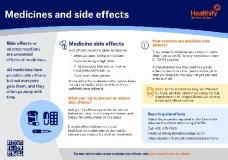You can now add Healthify as a preferred source on Google. Click here to see us when you search Google.
Melatonin
Sounds like 'mel-a-to-nin'
Key points about melatonin
- Melatonin is used to treat sleep problems.
- Melatonin is also called Circadin®, Vigisom®, Somnicare® and Melotin®.
- Find out how to take it safely and possible side effects.

Melatonin is a hormone made by the pineal gland in your brain, in response to darkness. It helps to regulate your body's sleep pattern and sleep–wake cycle. It’s secreted (released) in a daily rhythm, increasing in the evening and decreasing by morning, aligning sleep–wake cycles with the dark–light environment. It seems that less melatonin is produced as you get older.
What is melatonin supplement used for?
Melatonin, as a supplement, is available as tablets and capsules. Below are some common uses of melatonin.
Sleep problems (insomnia)
If you are over 55 years of age, melatonin may help shorten the time it takes you to get to sleep by about 10 minutes. It may also help the quality of your sleep. Most studies show that melatonin is usually not very effective for treating insomnia in adults under 55 years. It's best to use melatonin for a short time only (no longer than 3 months), to help you get back into a good sleep habit. Melatonin is not known to be addictive. Read more about sleep problems (insomnia), tips to improve your sleeping habits, and melatonin for sleep.
Jet lag
Melatonin can be effective for reducing or preventing jet lag, when taken at the right time. Talk to your healthcare provider about whether melatonin is recommended for you. Read more about melatonin for jet lag.
In Aotearoa New Zealand, you are allowed to buy immediate release melatonin for up to 10 days' supply for jet lag (less than 5mg per dose) but there are no products available to buy yet. As of August 2025 there are some products in the final stages of approval.
Sleep problems in children with neurodevelopment disorders
Melatonin may be prescribed for children and young people up to the age of 18 years who have neurodevelopment disorders that make it difficult to sleep.
In Aotearoa New Zealand, melatonin is mostly available as:
- Immediate release tablets: When you take these, all the melatonin is released straight away – similar to the body’s natural evening secretion. It's usually taken immediately before bedtime. It's more commonly used for jet lag.
- Modified release tablets (2 mg): Modified release (also called slow release) means that the medicine is released slowly over several hours. It's usually taken 1 to 2 hours before bedtime. This is often used by older adults with sleep problems.
Depending on your age, what it’s used for and your symptoms, you can get melatonin with a prescription written by a prescriber or after a consultation with a pharmacist from a pharmacy.
Prescription from your healthcare provider
You will need a prescription for melatonin for:
- insomnia in adults under 55 of age, delayed sleep phase disorder, and sleep issues related to shift work
- doses greater than 3 mg of immediate-release melatonin or 2 mg of modified-release melatonin
- all uses for people under 18 years of age.
Funding in New Zealand
If your healthcare provider has prescribed melatonin and you meet certain criteria (being diagnosed with insomnia because of a neurodevelopmental disorder and are under the age of 18 years), you may be eligible to have melatonin funded. Read more about Special Authority applications. Check with your healthcare provider. Other people will need to pay for the medicine.
Buying from a pharmacy
Jet lag: It's legal to buy melatonin over the counter in a pharmacy for jet lag, as immediate release melatonin and for up to 10 days' supply.
Sleep problems (insomnia) in adults aged 18 years and over: You can buy melatonin for up to 30 days' supply, over the counter. People 55 years and over may be able to purchase up to 13 weeks supply of modified release melatonin (2 mg) after consultation with a pharmacist (who has completed additional training to supply melatonin). They will assess whether melatonin is appropriate for you.
Buying melatonin from other countries
Melatonin purchased outside of a pharmacy in Aotearoa New Zealand isn't guaranteed in terms of its quality or safety. All medicines you bring into the country must be declared to New Zealand Customs. Read more about buying medicines online.
If you are over 55 years of age, melatonin may help shorten the time it takes you to get to sleep by about 10 minutes. It may also help the quality of your sleep. It's best to use melatonin for a short time only (no longer than 3 months), to help you get back into a good sleep habit. Melatonin is not known to be addictive. Most studies show that melatonin is usually not very effective for treating insomnia in adults under 55 years.
Before using melatonin for sleep problems, here are some things to consider.
- It’s important to remember that not everyone needs eight hours of sleep, and older people usually need less.
- Assess if something else might be causing your sleep problem such as anxiety, depression, restless legs, sleep apnoea, working night shifts, or side effects from medicine. If you think there's another problem, it’s important to talk to your healthcare provider.
- You can use the Twenty Winks Sleep Questionnaire to help understand your sleep problems.
- Setting up good sleep habits (sleep hygiene) is the first step to improving sleep. Learn more about how to improve your sleep.
Dose and timing
The 2 mg modified-release melatonin seems to be most effective in older adults with sleep problems and should be taken 1 to 2 hours before bed. There is no proof that higher doses work better and higher doses may cause more sleepiness during the day.
Jet lag happens when your body’s internal clock is disrupted, usually after long flights across two or more time zones. It causes symptoms such as tiredness during the day, sleep problems and difficulty concentrating. Jet lag usually lasts for about one to one and a half days for each time zone crossed, and it tends to get worse the more time zones you travel through. Jet lag happens because your body is still following the day–night cycle of the place you left. Although jet lag cannot be completely prevented, there are things you can do before, during and after travel to reduce its effects. Read more about jet lag.
Some people have found that melatonin, taken at the right time, may help them adjust more quickly to new time zones. It may be useful in adults, to prevent or treat the symptoms of jet lag, especially when travelling across two or more time zones, when flying east, or if you’ve had jet lag in the past.
Timing
Melatonin can help with jet lag, but it only works well if you take it at the right time. Depending on when you take it, melatonin can either help your body clock shift earlier or make it shift later. Here are some tips for using melatonin to manage jet lag.
- Take melatonin at bedtime in your new time zone (at your destination). This helps your body adjust to the new schedule. You can keep taking it for up to five nights after you arrive.
- Melatonin works best for eastward travel (when you're going to bed earlier than usual). It may not help as much when traveling west, since the body finds it easier to stay up later.
- Don’t take melatonin before 8pm. If you take it too early, it might shift your body clock the wrong way and make jet lag worse. It can also make you feel sleepy too soon in the evening.
- Don’t take it too late either (after 4am), as it likely won’t help your body clock and could make you feel groggy during the day.
- There’s no proof that taking melatonin before your flight helps. It’s best to start once you arrive at your destination.
Dose and formulation
The best dose of melatonin for jet lag isn’t exactly known. Taking between 0.5 mg and 5 mg seems to help about the same. Taking more than 5 mg doesn’t work any better. Immediate-release melatonin might be better for jet lag because it works more quickly in the body and matches how the body naturally releases melatonin.
In Aotearoa New Zealand, you are allowed to buy immediate release melatonin for up to 10 days' supply for jet lag (less than 5mg per dose) if you are over 18 years of age, but there are no products available to buy yet. As of August 2025 there are some products in the final stages of approval.
Melatonin may not be suitable for everyone. Let your healthcare provider know if you have the following conditions.
- An autoimmune disease (a condition in which your body is attacked by its own overactive immune system) such as rheumatoid arthritis, multiple sclerosis or lupus.
- Problems with the way your kidney or liver works.
- Depression.
- Are pregnant or planning a pregnancy.
- Are breastfeeding.
Also let your healthcare provider know if you're taking any other medicines. Some medicines may interact with melatonin.
Here are some things to know when you're taking melatonin. Other things may be important as well, so ask your healthcare provider what you should know about.
- Alcohol: Limit or avoid alcohol while taking melatonin because alcohol can affect how it works.
- Caffeine: Avoid products with caffeine in them as caffeine can affect how melatonin works.
- Smoking: Tobacco smoking affects melatonin levels. If you smoke, your healthcare provider can advise you on the best dose of melatonin.
- Effects on driving: Avoid driving after taking melatonin.
- Other medicines: Melatonin can interact with other medicines (such as warfarin and oestrogen), herbal supplements and rongoā Māori so check with your healthcare provider or pharmacist before starting melatonin or before starting any new products. This is especially important if you're taking other medicines that can cause drowsiness.
Like all medicines, melatonin can cause side effects, although not everyone gets them. If you're concerned about any symptoms you think might be related to your medicine, talk to your healthcare provider. The following information offers some guidance but doesn't include all possible side effects.
Tell your healthcare provider if these side effects bother you:
- Feeling tired, dizzy, sleepy or drowsy during the day: Avoid driving after taking melatonin.
- Indigestion, nausea (feeling sick), sore tummy, dry mouth: Try taking melatonin with food or a snack.
- Muscle, bone or joint pains.
- Feeling restless, irritable or anxious.
- Headache.
- Chest pain.
- Strange dreams.
Read more about medicines and side effects and reporting a reaction you think might be a side effect.
The following links have more information about melatonin. Be aware that websites from other countries may have information that differs from Aotearoa New Zealand recommendations.
Circadin (external link)Medsafe Consumer Information, NZ
Vigisom(external link) Medsafe Consumer Information, NZ
Melatonin(external link) Sleep Health Foundation, Australia
Apps
Sleep apps
Sleep as Android app
Brochures
Medicines and side effects(external link) Healthify He Puna Waiora, NZ, 2024
5 questions to ask about your medications(external link) Health Quality and Safety Commission, NZ English(external link), te reo Māori(external link)
References
- Melatonin(external link) NZ Formulary, NZ
- Melatonin(external link) NZ Formulary for children, NZ
- Melatonin without a prescription(external link) Medsafe, NZ, 2025
- Melatonin – is it worthwhile for sleep?(external link) BPAC, NZ, 2024
- Melatonin reclassified: Giving the right advice makes all the difference(external link) Pharmacy Today, NZ, 2025
Brochures

Medicines and side effects
Healthify He Puna Waiora, NZ, 2024

Health Quality and Safety Commission, NZ, 2019 English, te reo Māori
Credits: Healthify editorial team. Healthify is brought to you by Health Navigator Charitable Trust.
Reviewed by: Lucy Broughton, PGDipPharm and Angela Lambie, Pharmacist, Auckland
Last reviewed:





